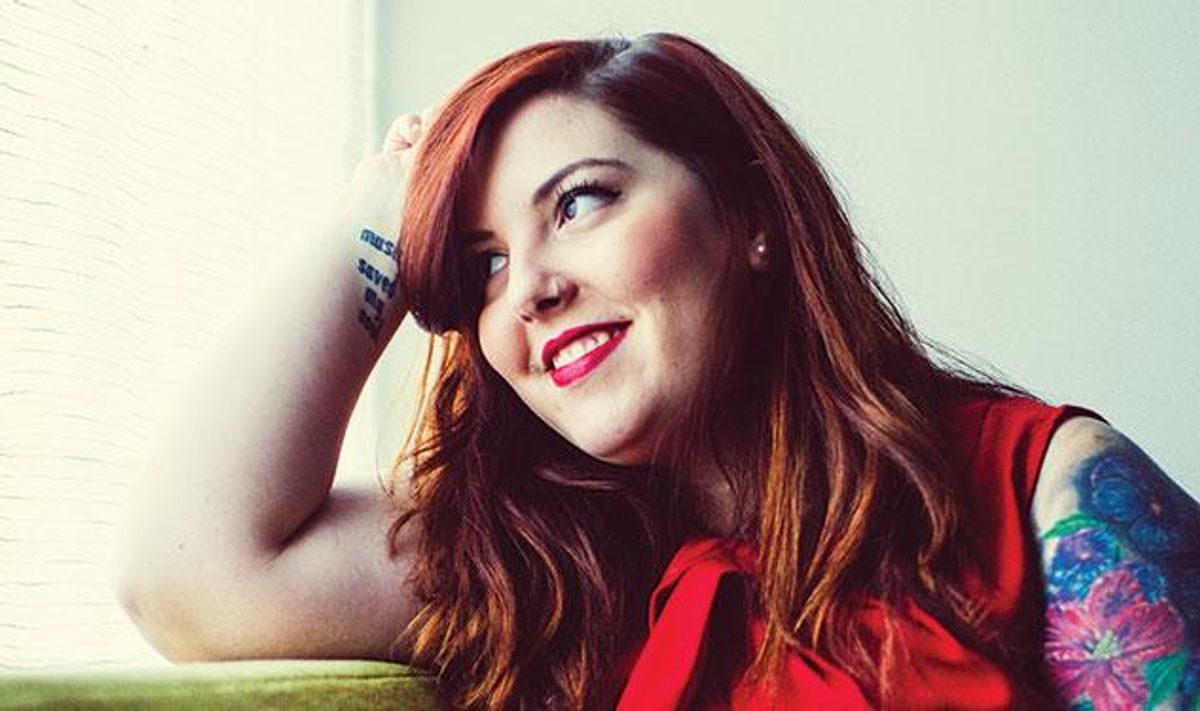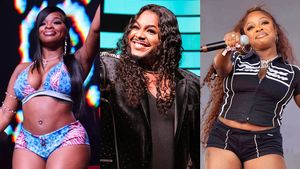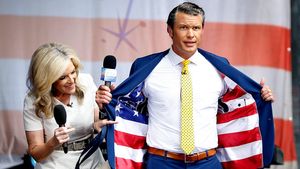Photography by Zoe Rain
Singer-songwriter Mary Lambert has two kinds of handwriting. Depending on her mood, Lambert writes in either loopy cursive or neat, insistent caps. The former is the kind of pretty, quirky script used for inner-wrist tattoos or inspirational Tumblr quotes; the latter could belong to a tax attorney.
Having just demonstrated both halves of her handwriting personality in a hotel room in New York, Lambert, curled up in an armchair, lets out a laugh. "I feel like maybe it's the bipolar," she says.
The casual openness of a statement like this can be both alarming and disarming, and Lambert is steadily carving a career out of that precise mix: radical, yet good-humored, candor. Her debut full-length album, Heart on My Sleeve (out October 14 from Capitol Records), opens with "Secrets," an upbeat pop tune whose first few lines find Lambert confessing in a catchy singsong: "I've got bipolar disorder, my shit's not in order / I'm overweight, I'm always late, I've got too many things to say." Then the triumphant chorus hits, against a backdrop of bright, brassy horns: "I don't care if the world knows what my secrets are. So-o-o-oh what?"
Heart on My Sleeve is aptly titled. It's a sonically wide-ranging album, as Lambert's expressive, expansive vocals prove well-suited to everything from slinky R&B jams and heart-tugging piano ballads to a gorgeous, minute-long spoken-word poem and a down-tempo cover of Rick Springfield's "Jessie's Girl" (which reimagines its subject matter as a lesbian's unrequited love for a straight woman). But throughout, what remains consistent is Lambert's honesty. Both on the album and in our interview, no topic -- her sexual orientation, her years spent bingeing on drugs and alcohol, her tough upbringing, her faith -- is off-limits.
Lambert grew up poor in Washington state. She taught herself to play guitar and piano after finding sheet music left behind by a family evicted from her apartment complex. "It was just a common thing," she says. "Every weekend, someone else would be evicted and the kids would just rifle through shit."
For Lambert, music became a means of processing the awful trauma she faced early in life. Her father, a respected figure in the strict Pentecostal community to which her family belonged, sexually abused her before leaving the family when she was 7. She became an atheist, and channeled her anger into writing music. "The first song that I ever wrote must have been when I was 9," she says. "It was on guitar, it was three chords, and it was the saddest fucking song." She murmurs a few bars.
By the time she was a senior in high school, Lambert finally settled into a fairly common suburban teenage life. She had a job at Starbucks, a place on the homecoming court, the lead in the school musical, and a cautious regained interest in religion, this time via Seattle's Mars Hill megachurch, where Lambert found a hip and supportive community -- at first.
Despite being the president of her school's gay-straight alliance (and having a lesbian mother, who came out when Lambert was young), Lambert didn't realize she was gay until senior year, when she met the girl who would become her first love. "It just hadn't occurred to me that I could possibly be gay," she says, "even though I didn't really enjoy physical interactions with men. I loved hanging out with boys and having boyfriends, but with the physical part, I was like, 'This isn't my favorite thing in the world.'"
Coming out presented complications. She couldn't reconcile her newly discovered sexuality with her newly rediscovered Christianity, particularly at Mars Hill, which preached tolerance but held a firm line that homosexual acts are sinful and immoral.

Lambert and company praying backstage before a concert
"I cried every Sunday for about a year," she says, adding that she and her girlfriend went through the crisis together. "We realized that we were both gay and it wasn't going to go anywhere, but we could at least repent and apologize to God for living in sin," she says. "You know, 'They say murderers can be forgiven, so...'"
It's a heartbreaking comparison, and Lambert knows it. "I was really, really miserable," she says softly. For the second time in her life, she left the church, choosing to focus instead on her own relationship with God, as well as on college and, afterward, on bartending while trying to navigate the music and spoken-word scenes in Seattle.
One day in 2012, Lambert's friend and fellow singer-songwriter and spoken-word artist Hollis Wong-Wear called with an opportunity. The hip-hop duo Macklemore & Ryan Lewis -- who'd landed the cover of XXL's annual Freshman Class issue but hadn't yet catapulted to national fame with "Thrift Shop" -- needed a hook for a song they were planning to release pegged to Referendum 74, which would eventually legalize gay marriage in Washington. If Lambert wanted the gig, she had two hours to write it.
"I was in front of my building, right across from the bar I worked at," Lambert remembers. "I ran there, had a shot of tequila, and then I ran back."
We all know how it ended: with Lambert warmly cooing, "I can't change, even if I tried, even if I wanted to / My love, my love, my love, she keeps me warm." You've heard it a million times, or maybe 2 million: the single, "Same Love," went double platinum. It also earned Macklemore, Lewis, and Lambert a Grammy nomination for Song of the Year, and at the awards ceremony in January, the trio sang the track with Madonna, while Queen Latifah married 33 gay and straight couples in the audience.
"Same Love" wasn't without critics, some of whom argued that Macklemore, a straight white guy, was appropriating the gay struggle, and many of whom conveniently forgot about Lambert's involvement. "I hate when people are like, 'Boo, gay rights coming from a straight, white male,' and I'm back here like, 'Hey!'" she says, raising her hand.
Lambert supports her collaborator, saying that Ben Haggerty (a.k.a. Macklemore) "really approached the subject matter in a very delicate way" and " came from the point of view of an ally," adding, "I wouldn't be here if [he and Lewis] hadn't given me the credit that they did."
In this moment, "here" means a lofty Manhattan suite, and it looks pretty good to Lambert. She's a Grammy-nominated artist about to release her first album, she's spent the summer touring, and she's in love -- with The Voice alumna Michelle Chamuel, whom she met after exchanging flirty tweets.
Lambert won't stop mining the hard stuff, particularly for the benefit of fans. It's telling that when she embarks on her tour this fall, her merchandise table will sell scarves she designed -- scarves that feature, yes, her own handwriting. "I wanted," she says, "to make something that my fans can cry into."
Catch Mary Lambert's intimate performance at SubCulture on Sept. 20, 8 & 10:30 p.m. in New York City. Watch the video for "Secrets" below:
























































































